City of Durham Parish Council
The Parish Council’s plaque to Sam Green was unveiled by LbiDem leader Sir Ed Davey on Sunday 16 November 2025 (link to YouTube video). The inscription reads
Sam Green
Durham City Councillor 1972-79
Lived at 40 The Avenue
A true trailblazer, Sam was the first
openly gay councillor elected in Britain
Sam actively represented
Crossgate Ward
alongside championing diversity
in public life
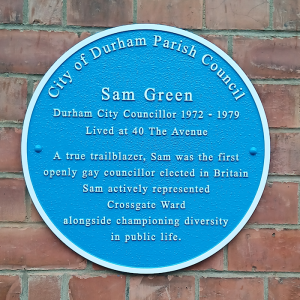
The Plaque
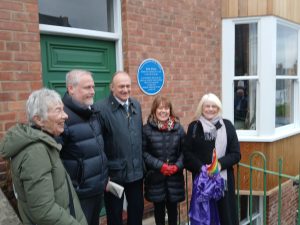
Left-to-right: Cllr Carole Lattin, Cllr Mark Wilkes, Sir Ed Davey MP, Mary Kelly Foy MP, Cllr Victoria Ashfield
Durham ice rink opened in 1940 at the start of World War Two and was located at this site.
Founded by local entrepreneur John ‘Icy’ Smith, the much-loved rink was home to the legendary Durham Wasps hockey team until 1996.
The site is now the Durham Passport Office.
The plaque was erected by the City of Durham Parish Council and unveiled by the renowned ice skaters Jayne Torville and Christopher Dean.
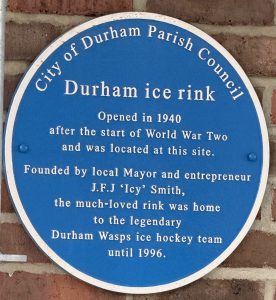
Durham Ice Rink plaque
The site of Durham University’s Women’s Hostel established on 22nd April 1899 as the first residential accommodation for women students. It was later renamed St. Mary’s College which is now located on Elvet Hill Road. The building subsequently became Durham’s head post office and is now Claypath Court, with a number of retirement flats.
Plaque erected by the City of Durham Parish Council
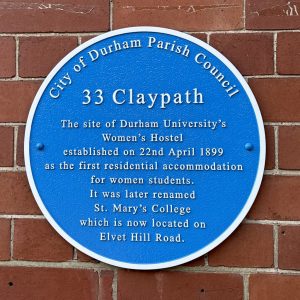
The plaque at 33 Claypath
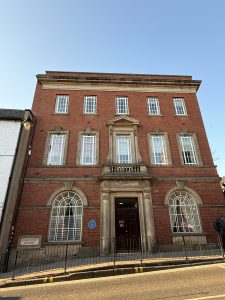
33 Claypath
Posted from Durham, Claypath, United Kingdom:
Professor Dame Rosemary Cramp renowned archaeologist and Anglo-Saxon specialised lived at 12 Church Street between 1972 and 1988.
The first female Professor at Durham University, she developed the University’s Archaeology Department and led notable excavations at the twin monastery of Monkwearmouth – Jarrow.
Plaque erected by the City of Durham Parish Council
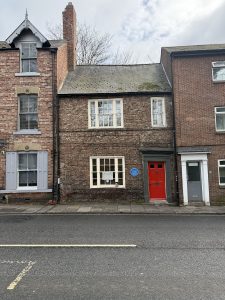
12 Church Street
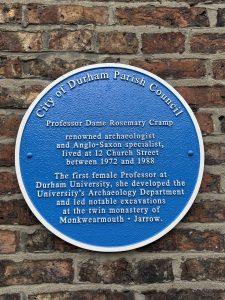
Plaque at 12 Church Street
Posted from 12, Church Street, Durham City:
World-renowned sculptor Dr Fenwick Lawson ARCA lived here 1977 – 2015.
The beloved ‘Journey’ and many other esteemed sculptures were created here.
Plaque erected by the City of Durham Parish Council
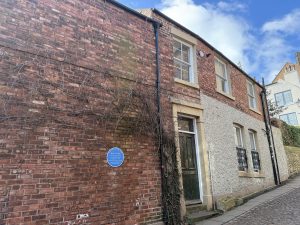
Bow Cottage
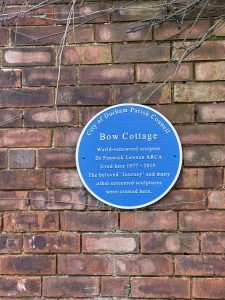
The plaque at Bow Cottage
Posted from Durham, Elvet, United Kingdom:
On 24 Feb 1328 John de Hert and Adam Tanner, keepers of the light of St Margaret’s, Crossgate, granted this property to Robert and Agnes de Plauseworth. It was formerly held by William de Cravan
Plaque erected by the City of Durham Parish Council
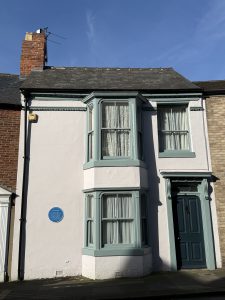
20 Allergate
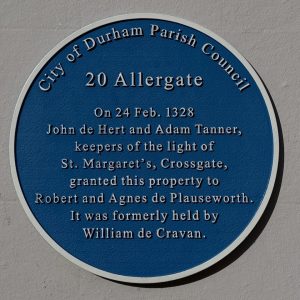
The plaque at 20 Allergate
Posted from Durham, City of Durham, United Kingdom:
Railway Cottages. These four houses are the last physical presence of the railway that ran to Elvet station. Passenger services ceased in 1931 but until 1954 Elvet re-opened annually for the Durham Miners Gala.
Plaque erected by the City of Durham Parish Council
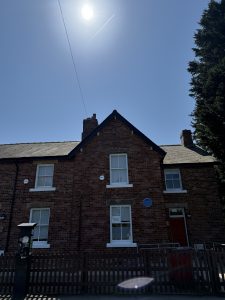
Railway Cottages
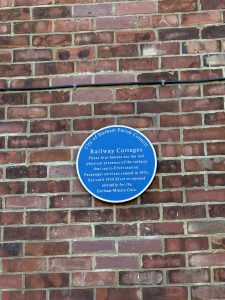
Plaque at Railway Cottages
Posted from Durham, Elvet, United Kingdom:
Neville House. Original site of Neville’s Cross College opened September 1921 as a teacher training college. Now home to Ustinov College, Durham University, opened September 2017 to continue the tradition of academic development and support for postgraduate students.
Plaque erected by the City of Durham Parish Council
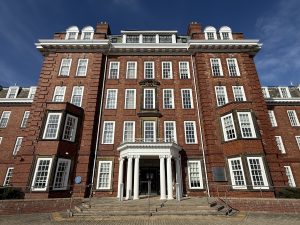
Neville House
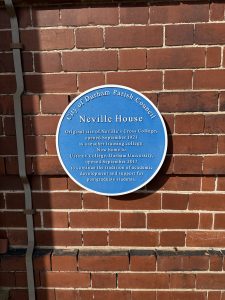
Plaque at Neville House
Posted from Neville House:
















